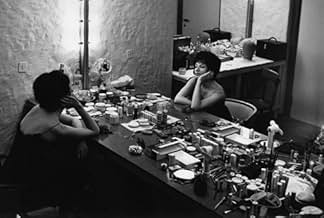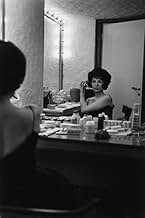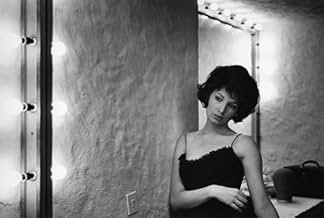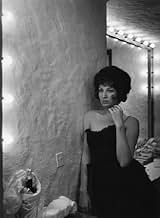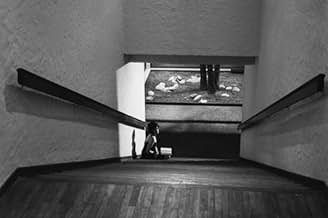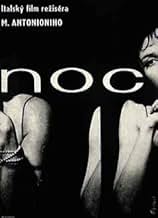A day in the life of an unfaithful married couple and their steadily deteriorating relationship.A day in the life of an unfaithful married couple and their steadily deteriorating relationship.A day in the life of an unfaithful married couple and their steadily deteriorating relationship.
- Awards
- 6 wins & 4 nominations total
- Il signor Fanti
- (as Guido Ajmone Marsan)
- Sé stesso
- (uncredited)
- Un invitato alla festa
- (uncredited)
- Sé stesso
- (uncredited)
Featured reviews
Of course, this film was a product of a time and a place and a sensibility that is now long gone. But be that as it may, this is an excellent film about a married couple who have fallen out of love. OK, no one will be viewing this looking for escapist entertainment. However if you are looking for what the Cinema can do without a blue-screen to enlighten, engross and even (dare I say it) entertain while at the same time shedding some light on human relationships - this film comes highly recommended. Excellent cast too!
With his refinement and cinematic artistry, Antonioni was definitely hitting on all cylinders during the early 60's doing stories that would probably raise a loud 'HUH?' at a Hollywood pitch session - then or now.
While I don't rate this at quite the same level as L'Aventura, this is up there with the best of his films (IMHO).
After he concluded with the two lovers willingly not pursuing their feelings at the end of L'Eclisse, he turned inwards, and with each subsequent film he peered under one more veil of false perception. But what was he trying to look into in La Notte, what does he find here?
La Notte is a step behind L'Eclisse, naturally. Here love matters, or is thought that it should, to the bitter end. The finale is overbearing with pessimism then because love fails to be that saving grace, that we're still alone, consumed by our desires. But that's not all of it either.
Even when Mastroyanni painfully knows that the love he cherished has vanished with time and habit, he still clings to it. Even a dragging routine is preferable than the emptiness of solitude. This is how love functions here, as a shelter that soothes the existential pains, or a mask that mercifully obscures them.
But these people are not simply lost adrift in faceless crowds and cold rooms, they're clinging on the craving of desire for their salvation. When I say that the mind is not transcended yet in these films of Antonioni's alienation phase, it's because it still dictates desire, the terms under which a meaningful life should be pursued.
But to show that love is not our saving grace because it's subject to the whims and tedium of time would be to concede that we are merciless at the hands of higher forces beyond our control, that we're not masters of our fate. It was important in this aspect to go a step beyond, to show us characters become aware of the emptiness of desire by willingly giving up on it. But for that we'd have to go ahead to L'Eclisse and Il Deserto Rosso.
By itself La Notte may seem like it's laboriously pondering to say too little. As part of an oeuvre though, it has a place that can't be dismissed lightly.
As the film opens, one morning in Milano, married couple Giovanni (Marcello Mastroianni) and Lidia (Jeanne Moreau) visit their friend Tomasso (Bernhard Wicki) in the hospital as he lays dying. Lidia is clearly shaken by the experience and, after Giovanni leaves for an appearance to promote his new book, the camera tracks Lidia through a long, aimless walk around Milano as she processes her thoughts. Here Antonioni (anticipating his later film Il Deserto Rosso) shows the drastically changing face of Milano in the postwar construction boom, and the appearance of new tech gadgetry in everyday life, as just one more way people can feel they have nothing certain they can hold on to in this world.
Giovanni and Lidia, while never outright squabbling, have clearly grown cold towards each other. Gradually one begins to wonder if there is any life left in their marriage whatsoever. Things come to a head, however, when Giovanni and Lidia go that evening to a party at a rich industrialist's villa, and Antonioni's favourite actress Monica Vitti appears. Vitti's role as a foil to Giovanni and Lidia is powerful and moving, but I think its precise nature should be left unsaid here, as it's better audiences aren't spoiled first.
A mere description of the plot might seem like nothing happens in this film besides bored people talking and yet another mid-century European cinematic tale of adultery. But LA NOTTE is a film of incredible visual poetry, almost like the work of Andrei Tarkovsky. Even scenes that evoke the characters' boredom are shot as such beautiful tableaux that the viewer is enraptured. Antonioni often shoots his characters reflected in mirrors and the like, and there is some cinematic legerdemain here that just makes you go "wow".
Appearing in Antonioni's body of work between two similar films that are often considered a trilogy, LA NOTTE has often got less buzz than its predecessor L'AVVENTURA, with its daring plot twist, or its successor L'ECLISSE with its chic Monica Vitti-Alain Delon love affair. But I think that in terms of the picture-perfect visuals and elegant pacing, LA NOTTE deserves every bit as much praise as those other two classic films.
Bosley Crowther had some kind words for the film, which also won a slew of awards: "Too sensitive and subtle for apt description are his pictorial fashionings of a social atmosphere, a rarefied intellectual climate, a psychologically stultifying milieu—and his haunting evocations within them of individual symbolisms and displays of mental and emotional aberrations. Even boredom is made interesting by him. There is, for instance, a sequence in which a sudden downpour turns a listless garden party into a riot of foolish revelry, exposing the lack of stimulation before nature takes a flagellating hand. Or there's a shot of the crumpled wife leaning against a glass wall looking out into the rain that tells in a flash of all her ennui, desolation and despair." To me, it all comes down to the cinematography. The casting of Jeanne Moreau and Monica Vitti was important, but the way we get that nice, stark and defined black and white is what I love to see. At a time the Americans had largely switched to color, some of the best in Europe were able to push black and white to the next level.
Did you know
- TriviaThis movie is considered the central film of a trilogy of alienation or unofficial "Incommunicability Trilogy" beginning with L'avventura (1960) and ending with L'éclipse (1962).
- GoofsWhen Giovanni pours champagne in the hospital, Bernhard Wicki (Tommaso) looks straight into the camera while turning his head from Lidia to Giovanni.
- Quotes
Lidia: [reading from a piece of paper] "When I awoke this morning, you were still asleep. As I slowly emerged from my slumber, I heard your gentle breathing and through the wisps of hair over your face I saw your closed eyes and I could barely contain my emotion. I wanted to cry out, to wake you up, because you slept so deeply, you almost seemed lifeless. In the half light, the skin of your arms and throat appeared so vibrant, so warm and dry that I longed to press my lips against it, but the thought of disturbing your sleep, of you awake in my arms again, held me back. I preferred you like this, something on one could take from me bacause it was mine alone - - this image of you that would be everlasting. Beyond your face I saw my own reflection in a vision that was pure and deep. I saw you in a dimension that encompassed all the times of my life, all the years to come, even the years past as I was preparing to meet you. That was the little miracle of this waking moment: to feel for the first time that you were and always would be mine and that this night would go on forever with you beside me, - with the warmth of your blood, your thoughts, and your will mixed with mine. At that moment, I realized how much I loved you, Lidia, and the intensity of the emotion was such that tears welled up in my eyes. For I felt that this must never end, that all our lives should be like an echo of this dawn, with you no belonging to me but actually a part of me, something breathing within me that could could ever destroy except the apathy of habit, which is the only threat I see. Then you awoke and with a sleepy smile, kissed me, and I felt there was nothing to fear that we'd always be as we were at that moment, bound by something stronger than time and habit."
- ConnectionsFeatured in Cinq colonnes à la une: Episode dated 1 December 1961 (1961)
- How long is La Notte?Powered by Alexa
Details
Box office
- Gross US & Canada
- $39,236
- Opening weekend US & Canada
- $10,547
- Sep 18, 2016
- Gross worldwide
- $40,703
- Runtime2 hours 2 minutes
- Color
- Aspect ratio
- 1.85 : 1
Contribute to this page




